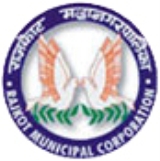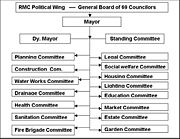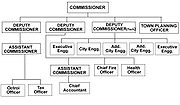
Rajkot Municipal Corporation
Encyclopedia
Rajkot Municipal Corporation is responsible for the civic infrastructure and administration of the city of Rajkot. The organization is known, in short, as RMC. It was established in 1973. This civic administrative body administers an area of 104.86 sq. km. RMC is headed by Mayor of Rajkot.
The governing structure of RMC consists of political and administrative wings. The political wing is an elected body of councilors headed by a Mayor. The Commissioner from the IAS
cadre heads the administrative wing and is responsible for strategic and operational planning and management of the Corporation. The Commissioner takes decisions on behalf of the Board or the Standing Committee formed from the elected councilors to perform the duties of the Corporation.
 The RMC is responsible for administering and providing basic infrastructure to the city.
The RMC is responsible for administering and providing basic infrastructure to the city.
 Administrative purposes the city is divided into 3 zones - Central, East and West. The city is further divided in 23 wards.
Administrative purposes the city is divided into 3 zones - Central, East and West. The city is further divided in 23 wards.
The Corporation is headed by a Municipal Commissioner, an IAS officer appointed by the government of Gujarat. He wields the executive power of the house. Each ward is represented by 3 corporators. An election is held to elect corporators to power. The mayor heads the party with the largest number of corporators elected. The mayor is responsible for the day-to-day running of the city services.
The governing structure of RMC consists of political and administrative wings. The political wing is an elected body of councilors headed by a Mayor. The Commissioner from the IAS
Indian Administrative Service
The Indian Administrative Service is the administrative civil service of the Government of India. It is one of the three All India Services....
cadre heads the administrative wing and is responsible for strategic and operational planning and management of the Corporation. The Commissioner takes decisions on behalf of the Board or the Standing Committee formed from the elected councilors to perform the duties of the Corporation.
Services

- Water purification and supply
- Sewage treatment and disposal
- Garbage disposalGarbage disposalA garbage disposal unit or waste disposal unit is a device, usually electrically powered, installed under a kitchen sink between the sink's drain and the trap which shreds food waste into pieces small enough—generally less than —to pass through plumbing.Garbage disposal units are widely used in...
and street cleanliness - Solid waste management
- Disaster management
- Building and Maintenance of roads, streets and flyovers.
- Street lighting
- Maintenance of parks and open spaces
- Cemeteries and Crematoriums
- Registering of births and deaths
- Conservation of heritage sites
- Disease control, including immunization
- Public municipal schools etc.
City Civic Center
Rajkot Municipal Corporation has started City Civic Center in different areas of city to get maximum advantage of the technology and give transparency in the day to day administration. RMC has five City Civic Centers operational in different areas of Rajkot Municipal Corporation for benefit of citizen of Rajkot. Now any citizen can access municipal corporation’s services within 3 km from their residence. All city civic center are connected with each other by online networking facility. City civic center provides facility like Property Tax Assessment and Collection, Water Charges Assessment and Collection, New water connection, Complaint Redressal, Shop and establishment, Birth and Death certificates, Building permission plans and various tax collection.- Amin Marg City Civic Center
- Krishna Nagar City Civic Center
- East Zone City Civic Center
- Central Office City Civic Center
- West Zone City Civic Center

The Corporation is headed by a Municipal Commissioner, an IAS officer appointed by the government of Gujarat. He wields the executive power of the house. Each ward is represented by 3 corporators. An election is held to elect corporators to power. The mayor heads the party with the largest number of corporators elected. The mayor is responsible for the day-to-day running of the city services.

